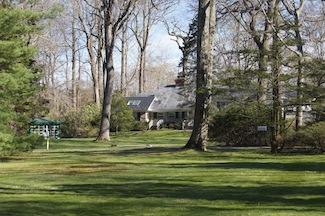NYS Supreme Court Upholds Scarsdale Planning Board Decision to Allow Subdivision on Cushman Road
- Wednesday, 12 March 2014 17:15
- Last Updated: Wednesday, 12 March 2014 17:22
- Published: Wednesday, 12 March 2014 17:15
- Joanne Wallenstein
- Hits: 21986
 Development of a six-lot subdivision on Cushman and Garden Roads will proceed, despite objections from a Willow Road resident who lives "downstream" from the property and fears that runoff from the development will endanger his property. A decision by the Scarsdale Planning Board to allow the KOS Building Group to move forward with the project was challenged by Robert Falk of 3 Willow Lane who brought an Article 78 proceeding to NYS Supreme Court objecting to the Planning Board's negative SEQRA declaration, which is a determination that the project would not have significant adverse environmental impacts.
Development of a six-lot subdivision on Cushman and Garden Roads will proceed, despite objections from a Willow Road resident who lives "downstream" from the property and fears that runoff from the development will endanger his property. A decision by the Scarsdale Planning Board to allow the KOS Building Group to move forward with the project was challenged by Robert Falk of 3 Willow Lane who brought an Article 78 proceeding to NYS Supreme Court objecting to the Planning Board's negative SEQRA declaration, which is a determination that the project would not have significant adverse environmental impacts.
Since both Falk's home and the proposed development sit in a designated sensitive drainage area, his attorney argued that runoff from the property would raise the water level in the stream that runs through his property to dangerous levels.
To receive approval from the Planning Board, KOS Building Group was required to submit a Storm water Pollution Prevention Plan (SWPPP) outlining their plans to install underground infiltration and retention tanks to capture storm water runoff. Experts retained by KOS contend that with the new system, storm water runoff volumes will be lower than at present. However Falk and his experts disputed these findings and took issue with the deep pit tests that were conducted to determine the seasonal high water level. They believed that forensic soil analysis should have been done to indicate the true seasonal high groundwater level and also argued that the testing was done during a relatively dry year and therefore the results were not representative of a typical wet season.
Both the Planning Board and KOS responded to Falk's objections saying, among other things, that his house is 300' away from the property and is separated from it by a street and another property. They claim that his allegations that his property will flood are speculative. The Planning Board contended that they followed all required steps in making their determination; holding four public meetings and hiring outside consultants and therefore met regulations for storm water infiltration and retention systems.
The court ruled that Falk did have "established standing" to bring the proceeding and demonstrated that he was at risk. However they found that there was a rational basis for the Planning Board's negative SEQRA declaration and that the determination was not "arbitrary or capricious." They denied the Article 78 petition.
Commenting on the decision, Falk stated: "I am very disappointed by the Court's Decision. This subdivision lies right in the heart of a sensitive drainage area. The runoff and flooding in this area is a serious problem. I am not opposed to development of this site; however, I sought assurances that the increase in storm water runoff from the new homes would be adequately managed. Any uncontrolled runoff from this site would end up in the stream in my backyard. My professional consultants submitted detailed reports to the Planning Board, explaining their technical concerns about the design of the Applicant's storm water system. My main concern was whether the Applicant accurately measured the seasonal high groundwater level. We think the Planning Board approved the project without having this key data. In particular, we think that the Board erred in failing to order the same kind of groundwater tests that were used in reviewing the storm water systems for two prior subdivision plans for this property. These plans were abandoned after the new tests revealed that the groundwater levels were materially higher than represented by the project engineer based on standard deep hole testing procedures."
Brad T. Schwartz, of Zarin and Steinmetz, who represented Falk said, "This Decision reaffirms that the legal standard for upholding municipal land use decisions is low. The Court determined that Mr. Falk did not meet the extremely high standard of proof required to show that the Planning Board acted arbitrarily and capriciously. Mr. Falk does not plan to appeal. "
Mr. Falk continued, "The Court did not say that the Planning Board did a good job in reviewing this application, or that it acted prudently under the circumstances. The Court only found that the Board satisfied the rationality test – an extremely low bar. Apparently, the Village believes that development trumps prudent storm water management, and because of the almost impossibly high standard of proof required to successfully challenge the actions of a municipal board, residents really have no practical recourse."
However, Joshua E. Kimerling of Cuddy and Feder who represented KOS Builders said, "We are pleased with the decision of the court as it is supported by the facts in the record for the subdivision and the meaningful review by the Planning Board in issuing the approval for the subdivision. We look forward to proceeding with the project."






